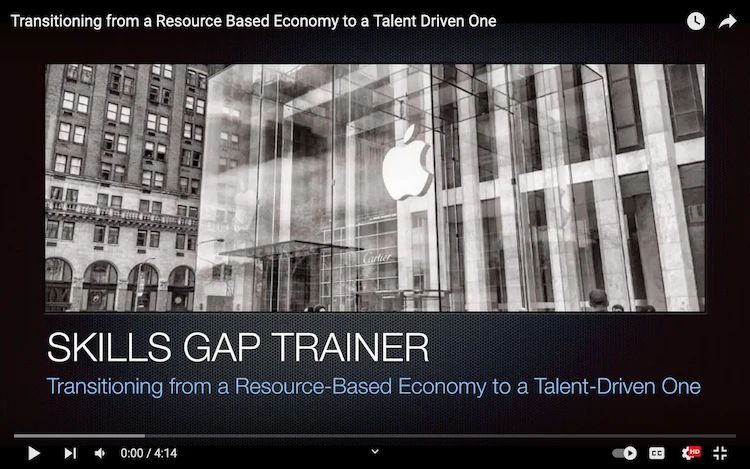In this new era, the skills and capabilities of the workforce, commonly referred to as “labor talent,” have taken center stage. Technological innovation, coupled with globalization, has given birth to an economy that thrives on a unique resource – human talent. In the past, the value of a nation’s economy was determined largely by its natural resources and physical labor. Today, intellectual capital, creativity, and technical skills play a significant role in driving economic growth and competitiveness.
-
Evolving Labor Needs and the Talent Resource
The new economy demands a variety of specialized skills, particularly in the technology sector. There is a surging demand for scientists, engineers, data analysts, and other tech-savvy professionals to pioneer and sustain innovation. However, the U.S., despite being home to Silicon Valley and a host of tech giants, faces a significant talent gap. This gap has not developed overnight but is the result of years of systemic issues, including an educational system that has not kept pace with the rapidly evolving industry needs.
-
The Skills Gap Dilemma in the U.S. and Canada
The problem of the skills gap is not exclusive to the U.S.; it is a global challenge. Even in Canada, a nation recognized for its robust education system and a strong influx of skilled immigrants, a skills gap in the technology sector persists. Both countries are grappling with an impending wave of retirements from the “baby boomer” generation, many of whom hold key technical roles. The pace at which new technical professionals are being trained is insufficient to fill the void that the retiring generation will leave. Without concerted efforts to revamp the education and training systems, these nations face the risk of lagging behind in the global economy.
-
The Role of Education and Professional Development
Mitigating the risks posed by the skills gap requires a multi-faceted approach. Primary among these is a major overhaul of the educational system. The curricula must be updated to include skill sets relevant to the digital age, including coding, data analysis, cybersecurity, artificial intelligence, and more. Beyond formal education, continuous professional development must be encouraged to keep up with rapidly evolving technology trends. Partnerships between educational institutions, government, and the private sector can also foster more effective vocational and technical training programs.
-
Promoting a Global Talent Economy
For countries like the U.S. and Canada to thrive in the global talent economy, they need to invest in homegrown talent while also attracting skilled professionals from around the world. Flexible immigration policies and programs that facilitate the entry and integration of foreign skilled workers can help bolster their technology sectors. Notably, global technology visionaries like Elon Musk and Sundar Pichai were born outside the U.S. but have made significant contributions to its technology industry.
In conclusion, the global economy in the technology age is highly dependent on the labor talent at its disposal. As natural resources and traditional manufacturing lose ground to technological innovation, the battle for talent intensifies. The countries that will succeed in this new landscape are those that can effectively harness and cultivate the potential of their human capital, while also being open to the global exchange of talent.
Related books and resources:
“The Talent Code: Greatness Isn’t Born. It’s Grown. Here’s How.” by Daniel Coyle – This book delves into how talent can be developed and nurtured, which ties into the need for cultivating labor talent in a technology-driven economy.
“The Industries of the Future” by Alec Ross – Ross provides a forward-looking analysis of emerging sectors and the types of job roles and skills that will be in demand, reflecting the transition from a resource-based economy to one driven by talent and innovation.
“Rise of the Robots: Technology and the Threat of a Jobless Future” by Martin Ford – Ford explores how technology, especially automation and AI, is reshaping the global economy and labor market, underscoring the importance of adapting to new job roles.
“The New Geography of Jobs” by Enrico Moretti – This book offers an in-depth look at how and why job opportunities are shifting, highlighting the growing importance of intellectual capital and skilled labour in urban areas.
“The Third Wave: An Entrepreneur’s Vision of the Future” by Steve Case – Case discusses the next wave of the internet and how it will transform businesses and the workforce, aligning with the shift towards more specialized and technology-driven job roles.
“A Whole New Mind: Why Right-Brainers Will Rule the Future” by Daniel H. Pink – Pink argues that creative and empathetic ‘right-brain’ skills will become increasingly valuable as technological advancements change the workplace, aligning with the demand for new, innovative talent.
“Human + Machine: Reimagining Work in the Age of AI” by Paul R. Daugherty and H. James Wilson – This book looks at how businesses can harness artificial intelligence to complement and augment human skills, relevant to discussions on adapting workforce skills for the technology age.
To see our Donate Page, click https://skillsgaptrainer.com/donate
To see our Instagram Channel, click https://www.instagram.com/skillsgaptrainer/
To see some of our Udemy Courses, click SGT Udemy Page
To see our YouTube Channel, click https://www.youtube.com/@skillsgaptrainer